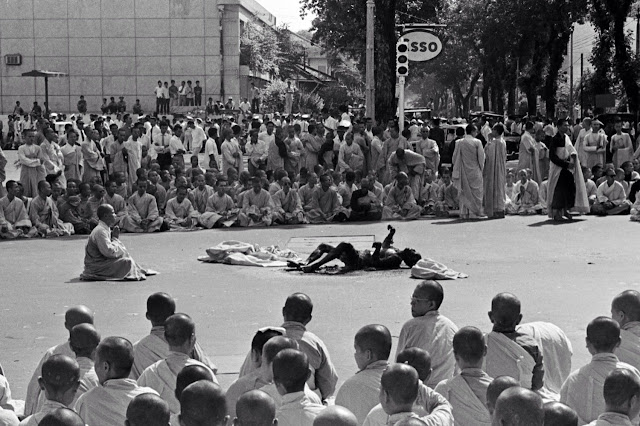From peashooter85
The self immolation of
Thich Quang Duc resulted in one of the most iconic photographs of Vietnam in
the 1960′s. As news of the self immolation traveled around the world, the
question arose, why did he do it?
At the time South Vietnam was primarily governed by a Vietnamese
politician named Ngo Dinh Diem. Diem had been made President of South Vietnam
in 1955 after winning a heavily rigged election. Although he was
officially the president of a representative government, in reality he had the
powers of a dictator. Diem was a Catholic, and throughout his rule he enacted
pro Catholic policies that heavily discriminated against non-Catholics. Around
70-90% of South Vietnamese citizens were Buddhist, but despite being the
overwhelming majority Buddhists found themselves second class citizens in their
own country. Catholics were favored for high ranking military and civil
positions, while Buddhists were likewise barred from such positions while
Buddhists serving in the military were turned down for promotions. Catholics
also were granted several privileges such as special tax breaks and exemption
from corvee labor (labor performed in lieu of taxes). The government
distributed firearms to local defense militias, but only to those in Catholic
villages. The Catholic Church was the largest land owner in the country, and
was granted special exemptions in land acquisitions. Catholic priests and
bishops often had private armies, which would loot or demolish Buddhist
temples, or conduct forced conversion of villages. The Vatican Flag was
flown at official government and public events, yet the Buddhist flag was often
banned during Buddhist holidays. In order to publicly celebrate Buddhists
holidays, special government permission was needed. In 1959, Diem
officially dedicated South Vietnam to the Virgin Mary. Yeah Diem was a man of
incredible chutzpah as well as excessive stupidity.
Diem’s Pro-Catholic
policies led to severe distrust between the South Vietnamese people and the
Diem regime. In May, the Diem government decreed that the Buddhist flag could
not be flown in Hue during the Buddhist holiday called Vesak, which celebrates
the Buddha’s birthday. In response, people protested by taking to the streets
and marching with Buddhist flags. Government forces responded by firing on the
crowd, killing nine. Protests erupted across the country. In one
incident, when monks occupied a square in protest, soldiers and police poured
liquid tear gas chemicals on the monk’s heads, severely wounding 69. Martial
law was also declared, and the military undertook a campaign or raiding
Buddhist temples, shrines, and pagodas. As the protests grew, the Diem regime
responded with increasingly heavy handed tactics. When students in Saigon
protested, Diem order 1,000 of them arrested and sent to re-education camps,
some of them being as young as 5.
After Duc’s self immolation many other monks would repeat the
act in protest. It is often erroneously stated that Duc burned himself to
protest the Vietnam War, however this is not true. It should be noted
though that throughout the Vietnam War, 5 American anti-war protesters repeated
the act between 1965 and 1970. Many people in Eastern Europe would do the same
in the late 1960′s and 1970′s in protest against Communism and the Soviet
Union. Under pressure from the American Government, South Vietnam’s prime
backer, Diem agreed to a list of demands by the Buddhists. However, Diem
never followed through with the agreement. In October of 1963, a US backed coup
erupted and toppled Diem’s regime. Diem was captured while trying to
escape on November 1st, and was executed by bayonet.

